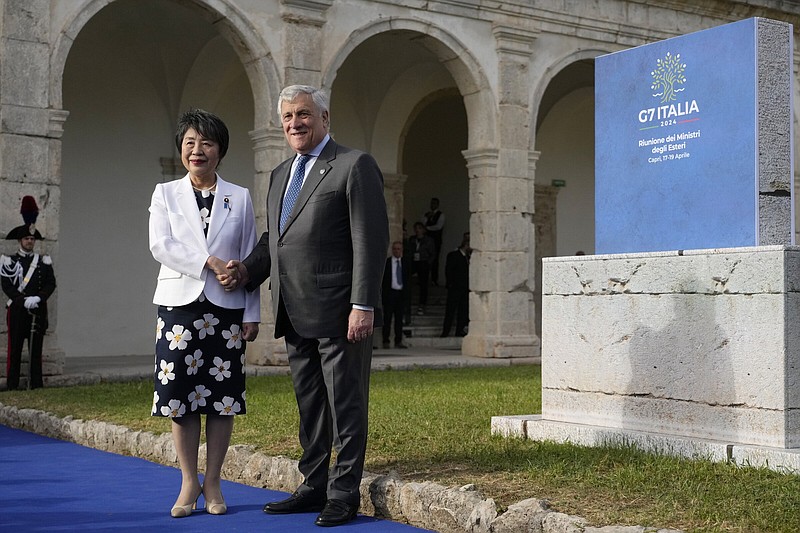CAPRI, Italy -- Group of Seven foreign ministers are meeting on the Italian resort island of Capri, with the agenda topped by calls Wednesday for targeted new sanctions against Iran over its attack against Israel and more aid to Ukraine to fight Russia's war.
Under Italy's stewardship of the rotating presidency, the G7 leaders are expected to issue a united call for Israel to exercise restraint after Iran's unprecedented weekend attack involving hundreds of drones, ballistic missiles and cruise missiles fired toward the Jewish state.
Italian Foreign Minister Antonio Tajani told The Associated Press on Wednesday that Italy supported targeted new sanctions against Tehran, specifically against the makers of drones used in the weekend attack and others launched by Tehran-backed militias in Lebanon and Gaza and by Yemen's Houthi rebels.
The United States, Britain and several European Union countries have suggested expanding current sanctions regimes against Tehran over its support of Russia's war in Ukraine to include drone and missile deliveries to Iran's Mideast proxies.
"So, for example, people sending drones to Houthis? Sanctions," Tajani said, adding that he expected the G7 ministers to discuss the options in Capri.
Tajani met later Wednesday with U.S. Secretary of State Antony Blinken.
With Israel's war in Gaza in its sixth month, Tehran's attack added a new element of urgency to the three-day meeting of foreign ministers from Britain, Canada, France, Germany, Italy, Japan and the United States, gathering on the picturesque island that has long been a playground for the European jet-set.
German Foreign Minister Annalena Baerbock also called for new sanctions against Tehran and made a last-minute visit to Israel that made her miss Tajani's welcome ceremony on Capri, which was also not attended by other late-arriving ministers.
"We will discuss how a further escalation with more and more violence can be prevented," she said. "Because what matters now is to put a stop to Iran without encouraging further escalation."
Germany, a staunch ally of Israel, has been among the chorus of European and U.S. leaders urging Israel to de-escalate tensions and not retaliate for Tehran's attack, which was largely repelled thanks to U.S. and allied help.
In Washington, White House national security adviser Jake Sullivan said expected new U.S. sanctions would target Iran's missile and drone program and entities supporting the Islamic Revolutionary Guard Corps and Iran's Defense Ministry.
"We anticipate that our allies and partners will soon be following with their own sanctions," Sullivan said in a statement.
British Foreign Secretary David Cameron said he would push for "coordinated sanctions against Iran" at the meeting. He argued that Tehran was orchestrating "so much of the malign activity in this region" from Hamas in Gaza, to Hezbollah in southern Lebanon to the Houthi rebels in Yemen who are behind attacks on shipping in the Red Sea.
"They need to be given a clear and unequivocal message by the G-7 and I hope that will happen," Cameron told broadcasters during a visit to Israel.
Russia's two-year war in Ukraine is also high on the agenda, with Ukrainian Foreign Minister Dmytro Kuleba and NATO Secretary General Jens Stoltenberg invited to the Capri meeting today as guests. Kuleba is expected to underline his country's need for essential military support, including artillery, ammunition, and air defense systems to bolster its capacity as Russia pushes along the front line.
"If we want to achieve peace, we need to have a position without the defeat of the Ukrainian army," Tajani told the AP, acknowledging the holdup in U.S. funding was hurting Ukraine militarily but expressing hope that the impasse would be resolved.
Information for this article was contributed by Fatima Hussein and Kirsten Grieshaber of The Associated Press.

